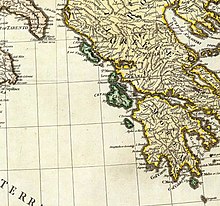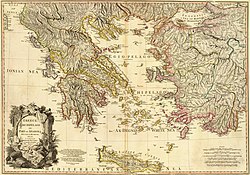
Back الحكم البندقي للجزر الأيونية Arabic Ενετοκρατία στα Επτάνησα Greek Islas Jónicas bajo dominio veneciano Spanish Joonia saared Veneetsia võimu all Estonian Îles Ioniennes vénitiennes French Kekuasaan Venesia di Kepulauan Ionia ID Isole Ionie sotto il dominio veneziano Italian Млетачка власт на Јонским острвима Serbian Ìzołe Jònie soto el domìnio venesian VEC
| The Ionian Islands | |||||||||
|---|---|---|---|---|---|---|---|---|---|
| Colony of the Republic of Venice | |||||||||
| 1363–1797 | |||||||||
 The Ionian Islands in green. Map of 1785, when the Islands were still part of the Venetian Republic. | |||||||||
| Capital | Corfu | ||||||||
| Historical era | Middle Ages | ||||||||
• Fourth Crusade | 1202–1204 | ||||||||
• Established1 | 1363 | ||||||||
| 1463–1479 | |||||||||
| 1499–1503 | |||||||||
| 1718 | |||||||||
| 1792– 1797 | |||||||||
• Treaty of Campo Formio | 17 October 1797 | ||||||||
| |||||||||
| Today part of | Greece | ||||||||
| 1 Each island became part of the Venetian empire in different dates. 1363 refers to Cythera and Anticythera. | |||||||||
| History of Greece |
|---|
 |
|
|
The Ionian Islands were an overseas possession of the Republic of Venice from the mid-14th century until the late 18th century. The conquest of the islands took place gradually. The first to be acquired was Cythera and the neighboring islet of Anticythera, indirectly in 1238 and directly after 1363. In 1386 the Council of Corfu, which was the governing body of the island, voted to make Corfu a vassal of Venice. During the Venetian period the Council remained the most powerful institution on the island. A century later, Venice captured Zante in 1485, Cephalonia in 1500 and Ithaca in 1503. These three islands modelled their administration on Corfu's model and formed their own councils. The conquest was completed in 1718 with the capture of Lefkada. Each of the islands remained part of the Venetian Stato da Màr until Napoleon Bonaparte dissolved the Republic of Venice in 1797. The Ionian Islands are situated in the Ionian Sea, off the west coast of Greece. Cythera, the southernmost, is just off the southern tip of the Peloponnese and Corfu, the northernmost, is located at the entrance of the Adriatic Sea. It is believed that the Venetian period on the Ionian Islands was generally prosperous, especially compared with the coinciding Tourkokratia — Turkish rule over the remainder of present-day Greece.[1]
The governor of the Ionian Islands during the Venetian period was the Provveditore generale da Mar, who resided on Corfu. Additionally, each island's authorities were divided into the Venetian and the domestic authorities. The economy of the islands was based on exporting local goods, primarily raisins, olive oil and wine, whereas Venetian lira, the currency of Venice, was also the currency of the islands. Some features of the culture of Venice were incorporated in the culture of the Ionian Islands, thus influencing to this day local music, cuisine and language.
© MMXXIII Rich X Search. We shall prevail. All rights reserved. Rich X Search